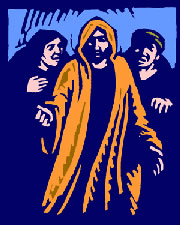
3rd Sunday of Easter Year A
For many centuries, Christian awareness has not been focused as it should be, on all that the Saviour’s Resurrection means in the life of the Church. That the Church lives through ‘the power of the resurrection’ was the central truth preached by the apostolic Church. This is clearly illustrated in today’s readings. The manifesto proclaimed by Peter on the day of Pentecost hinges on this truth – the resurrection is pointed to as unassailable evidence that it is intervention of the God of Israel’s faith that is being announced; but more than that, established ‘at God’s right hand’ the Risen Christ now bestows the Holy Spirit on the infant Church and sends it forth on its mission. In the Letter of Peter, probably written shortly before his martyrdom, Peter takes up the same theme – the Saviour has been ‘raised from the dead and given glory’ so that believers may share in his new life through their ‘faith and hope in God’.
Luke’s account of what took place on the road to Emmaus inspires us each time we hear it. It is told, that later generations of believers may share the experience the first disciples of Jesus, as they learned to make the Risen Lord the centre of their lives. Their finding of faith is a reversal of all that their earthly expectations had looked forward to: ‘Our hope had been that he would be the one to set Israel free’. The fulfilment of their hopes was not to be a political triumph, but a messiah who drew close to them at sunset on the dusty road of their disappointment. Recognising him called for a change of heart: coming to know – through the full message of the Scriptures – the ways of God, so different from the ways of worldly wisdom. It is through a renewed appreciation of the great drama recorded in the Scriptures that the Church will find the strength it needs to face today’s challenges. ‘Ignorance of the Scriptures is ignorance of Jesus Christ’ – words as true today as they were when they were first written by St Jerome in the 4th century. Touched by the message that makes their hearts ‘burn within them’, they ask the stranger to stay in their company. How easily, in the bustle of our lives, we pass up the opportunity to enter more deeply into the relationships and special moments that can nourish our faith.
In the end, it is in ‘the breaking of bread’ that the eyes of faith are fully opened for them, and they joyfully accept the Saviour and enter upon the revolutionary way he has opened up for them. As we strive to give the Eucharist the central place it should have in our relationship with our Risen Lord, it is important to recognise that it is, before all else, in our conscious participation in the Eucharistic action (‘Do this in remembrance of me’) that this gift of the Saviour will be the great source of the Church’s life – enabling us to bring our lives, our needs, and the needs of all God’s people, to the Father, as we are caught up by the Saviour into his great self-offering. Veneration of the reserved sacrament - a venerable practice in our Western Church - should not detract from the supreme importance of the Mass; it should, we are told in today’s official teaching, increase our hunger to ‘take and eat’.
In the joy and wonder of their new-found faith, the two disciples ‘set out that instant’ to rejoin ‘the Eleven and their companions’ in Jerusalem. It is in a vital Christian community that we will find the support and confirmation we need in our journey of faith.
John Thornhill sm

